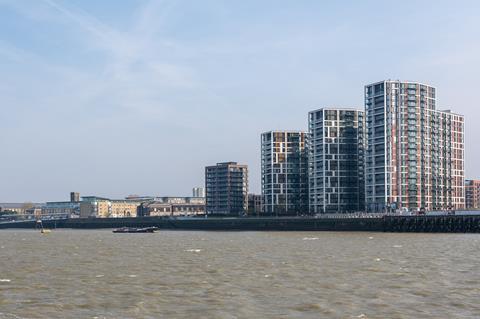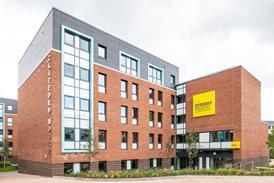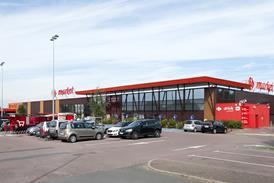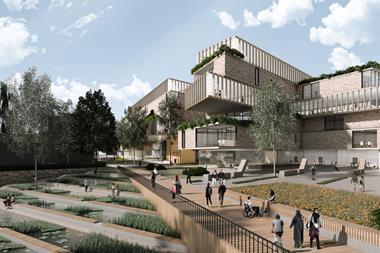Tributes have been pouring in for Tony Pidgley, the larger-than-life developer who died last week at the age of 72.

Figures from across the real estate industry have shared their memories of the residential property tycoon who rose to become one of the sector’s most prominent figures.
Berkeley Group, the company which he founded in 1976, released a statement last Friday announcing his death following a stroke.
Renowned for his relentless work ethic and keen eye for detail, Pidgley made his fortune through taking on difficult sites and correctly calling a series of peaks and troughs in the UK housing market, buying land when others were overly cautious and selling it when others were overly confident.
Through Berkeley Group, he was behind some of London’s most audacious housing schemes, including the redevelopment of the Ferrier Estate in Kidbrooke, the reinvention of the Royal Arsenal munitions site in Woolwich and the revival of Hackney’s Woodberry Down estate.
“He created a new property story,” says Sir Stuart Lipton. “He had the gift of judgement, of knowing when to buy, what to build, what the public wanted. He started in a small way and created an extraordinary company with fantastic financial results.”
Lipton adds: “I would always remember him saying ‘I am not a housebuilder’, and I think he was right to say that, because housebuilders are really in a different market. He wanted to deliver property with good judgement, good architects and good product. I’m full of admiration for what he did and he will be a real loss to the industry.”
Pidgley was a workaholic. Asked what he did in his spare time, he would often reply wryly: “Berkeley.”
Waking up at 5.45am most mornings and work weekends, when he wasn’t on a building site he could often be found at the desk of his Cobham HQ office next to six large maps on the wall covering London, where most of his projects were delivered, although in later years Pidgley also turned his gaze towards Birmingham, where he hoped to cash in on a rise in housing demand with the coming of HS2.
Key legacy scheme
Peter Murray, chairman of New London Architecture, was taken by Pidgley on several tours of his different developments in the capital. “It’s Kidbrooke Village that will be his key legacy once it’s fully completed,” he says.
“That’s because Kidbrooke is a redevelopment of a council housing estate that had definitely run its course, and he’s created a high-quality environment and well-designed homes. He always retained a common touch.
“I remember going around Kidbrooke with him a few years ago and he had something to say to everyone – the receptionist, the chap on security. He maintained contact with people at all levels who were working for him.”

Pidgley’s rags-to-riches story is the stuff of legend. The former Barnardo’s boy was adopted by a family of gypsies and at one stage lived in a disused train carriage.
He left school at 15 to form his own haulage and plant hire company. At 19, he sold the business to Crest Homes, becoming a building director before leaving to form Berkeley in 1976.
During his half-century in the trade, Pidgley became renowned for his shrewd calls on the property market, famously liquidating his stock in the late 1980s ahead of a vicious market downturn between 1990 and 1992.
Early last year, the Berkeley boss made a trip back to where it all began, visiting the first house he ever bought, in Shepperton. He snapped it up with £250 in his account and an extra £250 loaned from the bank, and turned it around two years later for £6,000. “You can’t do that any more,” he said at the time of his return, citing red tape as the major difference.
I’m full of admiration for what he did. He will be a loss to the industry
Sir Stuart Lipton, Lipton Rogers
Bureaucracy in the planning system was one of his chief gripes, and Pidgley would often use his position to call for more investment and greater flexibility in the sector.
As well as building Berkeley into a FTSE 100 company, he was the longest-serving president of the London Chamber of Commerce and Industry and was awarded a CBE in 2013 for “services to the housing sector and the community”.
Homes England chief executive Nick Walkley remembers: “He was somebody I had challenging business conversations with and one of the best negotiators I’ve ever encountered, but the thing I’ll most remember him most for was his work in the aftermath of Grenfell.
Decency and leadership
“He didn’t just say it touched him. He mobilised his entire organisation to figure out what could be done quickly in the aftermath. The conversations I had with him in that period were very meaningful and powerful. They embodied real humanity and demonstrated his decency, leadership and values.”
It is a view echoed by Susan Freeman, partner at Mishcon de Reya. “Tony Pidgley did everything in his own, inimitable way,” she says. “At the London Councils Housing Conference last year, he spoke alongside Darren Rodwell, Fiona Fletcher Smith of L&Q and Ann Buchanan. Ann, a long-standing residents’ association member of Kidbrooke Village, talked movingly about Berkeley’s regeneration of what had been the notorious Ferrier Estate and what this had meant for her and her family. The mutual respect between Tony and Ann was apparent for all to see.”
Pidgley also won plaudits from the City for routinely outperforming when it came to financial results.

Equity analyst and Property Week columnist Alastair Stewart recalls Pidgley giving a presentation to his blue-blooded investment bankers. One UBS director intoned “what is your WACC [weighted average cost of capital], Mr Pidgley?”
“What’s my whack?” he responded, slapping his wallet on the table. “That’s my whack!”
Like most listed housebuilding bosses, Pidgley faced criticism from some quarters over his vast pay packets (last year he was estimated to be worth almost £300m in The Sunday Times Rich List).
So frequent were the questions about his pay that Pidgley resorted to using a set of paper cue cards when journalists brought up the issue. He would jokingly pull out the cards and rattle off rehearsed lines about the company’s tax contribution and long-term pay plan.
“Every industry needs characters and Tony was a fabulous one,” says Liz Peace, chair of Real Estate Balance. “It struck me when I first joined the property industry that there were two types of people. One was the spreadsheet merchants, the other the intuitive property people like Ian Henderson, Gerald Ronson and John Ritblat. Tony was one of those – he had a massive intuition for knowing what would work.”
In recent years, Pidgley had also invested money in modern methods of construction (MMC), creating a modular factory in Kent that is set to open later this year.
He had a massive intuition for knowing what would work
Liz Peace, Real Estate Balance
“Even though he spent so long building in a very traditional manner and being a traditional developer, Tony understood the weaknesses increasingly emerging in that model, and that’s why he pioneered the thinking in terms of moving towards modern methods of construction,” according to Mark Farmer, CEO of Cast Consultancy and the government’s modular tsar.
He remembers: “I first met Tony in the mid-1990s when I was a young surveyor working on one of his projects and he had this aura about him. He was really demanding and had an absolute eye for detail – it was all about the customer. It was always really detailed stuff that you wouldn’t expect a CEO or chairman to be into, particularly for the size of Berkeley – but that’s the way he always operated.”
Taking care of business
Pidgley also left his mark on politicians, with MPs including housing minister Christopher Pincher paying tribute in recent days.
David Jennings, chairman of the property networking forum Movers & Shakers, says: “Tony had such a great relationship with all the boroughs and it mattered not to him what political colour they were. It was more about the people running them and whether they were on the same wavelength. Where others struggled with local authorities, I don’t remember him struggling.”
In Pidgley’s obituary, veteran journalist Peter Bill says: “He knew the building game better than any of the chief executives of the volume housebuilders. Curious to know what a man with over £300m does with his money, I asked. ‘I keep it!’ he smiled, before telling me of his disdain for those who use fancy money managers to grow their pile. He doesn’t keep all of it, of course. He mentioned giving a fair bit away.”
One of Bill’s memories was taking a photograph of Pidgley as they toured his Goodman’s Fields development to the east of the City: “We were followed round by a slightly terrified site manager. Every now and again Tony would stop and point: ‘‘Ere… get rid of that rubbish, looks untidy… these tiles look a bit wonky, get ‘em laid again… what’s that in the window? Clear it out!’ Just another normal day at Berkeley for the man who took care of business on site and not in the boardroom.”































No comments yet